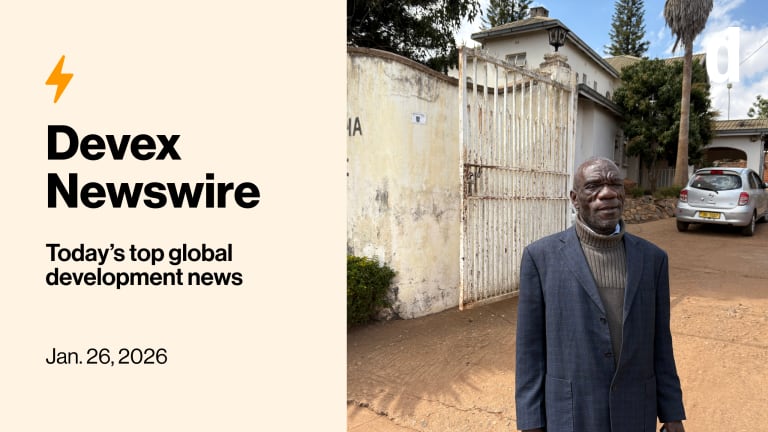Presented by Paris Peace Forum

Can the private sector help the world eat healthier? What about reproductive health? We explore how development is making the business case for its success.
Also in today’s edition: The Trump administration eyes expanding the Mexico City Policy.
+ How does a major corporate player such as MSD — known as Merck & Co in the U.S. and Canada — structure its global health and social impact work? And where are there opportunities for collaboration? Find out tomorrow in a Devex Pro event with MSD senior officials. Save your spot now.
Healthy returns
Nutrition doesn’t exactly scream, “Hey, give me your investment dollars!” — especially when we’re talking about nutrition in low- to middle-income countries, where the issue is viewed more through the prism of foreign assistance than private capital.
But is there a macroeconomic case for nutrition in LMICs?
The World Bank thinks so. It estimates that for every dollar spent on nutrition, the world gets $23 in return. That includes interventions to treat wasting with ready-to-use therapeutic foods and fortifying foods with nutrients, my colleague Elissa Miolene writes.
While nutrition in LMICs is often associated with too little food, it’s also about having too much — specifically ultra-processed foods that are causing obesity rates to soar.
Last month, UNICEF found that obesity exceeded underweight as the most prevalent form of malnutrition, affecting 1 in every 10 children and adolescents around the world.
“Ultra-processed food is increasingly replacing fruits, vegetables and protein at a time when nutrition plays a critical role in children’s growth, cognitive development and mental health,” UNICEF Executive Director Catherine Russell said in a statement.
The role the private sector can play in combating the problem drew a packed session at Building Bridges, a three-day conference in Switzerland that explored the linkages between sustainability and finance.
“What we’ve heard a lot from investors is that they think [investing in nutrition] is very interesting, but they want to see it work first,” Thierry Buchs of the Swiss Agency for Development and Cooperation said at the conference. “First, come and see us with a portfolio, and with the business case, because we have to make sure it’s investable and that we get the money back. And then we’ll invest.”
Read: What's the business case for investing in nutrition?
+ We’ll be sending a special edition newsletter soon that’s packed with all the highlights from the Building Bridges conference in Geneva. Keep an eye on your inbox!
Private investment
U.S. funding for organizations specializing in sexual and reproductive health and rights has always oscillated depending on the political party in power. Republicans rescind it; Democrats restore it.
But with the added burden of across-the-board aid cuts, the SRHR sector is also looking toward the private sector, which will be integral if development is to survive, let alone thrive, in a post-USAID world.
MSI Reproductive Choices is a case in point.
“At MSI, we have faced challenges with [official development assistance] for a long, long time, longer than many other organizations may have faced this year, because it comes in cycles with the change of administration in the U.S. So we kind of weaned ourselves off over USAID funding over time,” Sam Tiwari, head of philanthropy at MSI Reproductive Choices, tells my colleague Jenny Lei Ravelo.
But that’s no longer enough, so MSI is turning to impact investing to help women and girls — especially those in middle-income countries in Asia that often no longer qualify for grants.
It’s hoping impact investing will allow it to provide millions of women and girls in growing urban centers with high-quality sexual and reproductive health care services, while ensuring that foreign aid and philanthropic grants are spent meeting sexual and reproductive health needs in remote, rural, and underserved communities.
“In order to be ambitious about the scale, we have to be ambitious about the kind of capital that we are attracting into this model,” Tiwari says. But she also cautions that impact investors should also be aligned with the organization’s mission.
“This model is very promising to a certain kind of donor. I wouldn’t say that it’s for everyone,” she says. “At the end of the day, we are a reproductive health organization that’s committed to family planning and safe abortion. So there has to be alignment on the ideology.”
Read: Why MSI is exploring impact investing for reproductive health financing (Pro)
+ The World Health Summit kicks off on Oct. 12 in Berlin, and Devex will be on the ground as a media partner. We’re also hosting an official side event at 4 p.m. on the same day — Who pays for health? Industry’s role in a post-aid era. If you are registered to attend WHS, you can RSVP here to attend our event.
Ideology politics
For years, family planning groups such as MSI have seen their funding ebb and flow because of U.S. politics, but now, many other organizations could find themselves in the same situation.
A long-rumored Trump administration policy that would expand restrictions placed on funding abortion to a wider range of activities is reportedly close to public release, my colleague Michael Igoe tells me.
According to multiple organizations aware of the administration’s plans, the White House is on the verge of expanding the Mexico City Policy — which prohibits funding to organizations that provide abortion-related services — to further restrict activities related to diversity, equity, and inclusion, as well as gender rights-related programs.
“What we’re expecting next … is a massive ideological weaponization of foreign assistance,” said Beirne Roose-Snyder, senior policy fellow at the Council for Global Equity, in a press briefing last week.
The new policy, which is reported to fall under the moniker of “human flourishing,” is expected to expand restrictions on U.S. foreign aid funds beyond those currently imposed by the so-called global gag rule. While this policy bars U.S. global health funding to organizations that provide abortion services or counseling, the new policy will reportedly extend to all U.S. foreign assistance funds and encompass a much broader range of activities.
It is also expected to apply to U.N. agencies and humanitarian assistance funds, which were previously exempt from such restrictions.
“This isn’t about what can be done with U.S. funds. It’s about restricting the speech and the activities of organizations, multilaterals, and governments outside of their U.S.-funded work,” Roose-Snyder said.
ICYMI: The winners and losers of ‘America First’ foreign aid (Pro)
+ Dive deep into the future of U.S. foreign aid! Devex Senior Reporter Michael Igoe’s special Saturday Devex Pro Insider will bring you insider analysis and answers to the biggest questions surrounding U.S. aid. This newsletter is exclusively for Devex Pro members. Not yet a Devex Pro member? Start your 15-day free trial today.
Malaria’s ROI
The creeping limitations on bilateral assistance are further spurring development advocates to embrace business rhetoric. Malaria No More, for one, is making a strong case for the return on investment in controlling malaria.
Every dollar the U.S. invests in African malaria control returns $5.80 in economic growth — “outperforming most Wall Street investments,” according to a new report by the global nonprofit and the Corporate Council on Africa.
“With $126.9 billion in untapped GDP waiting to be unlocked through malaria elimination, this represents one of the largest business opportunities hiding in plain sight. The choice for the U.S. is simple: lead this $4 trillion market transformation or watch competitors capture the returns,” that report notes.
Martin Edlund, CEO of Malaria No More, says the findings are in sync with the Trump administration’s new “America First Global Health Strategy.” Edlund pointed out that the malaria pipeline is brimming with groundbreaking technologies, many developed by U.S. companies.
By 2050, 1 in 4 people will be African, making the continent an increasingly important growth market for American businesses and investors. Florizelle Liser, president and CEO of the Corporate Council on Africa, says investors also weigh health security when evaluating opportunities on the continent. “They’re saying, ‘OK, a country that is investing in its health systems is a country that’s going to actually provide a better environment for us as a corporate,’” she explains.
“It is just as important, for example, as investing in roads and ports, because it is going to create an environment where people can be healthier, they can show up for work more often, they can be more productive,” Liser adds. “Companies basically can be more profitable, and more investment will be drawn to those countries.”
Read: Why beating malaria is smart business for America
+ For more content like this, sign up to Devex CheckUp, our free weekly newsletter that provides front-line and behind-the-scenes reporting on global health.
In other news
The U.S. retreat from the United Nations and the defunding of its key agencies have allowed governments such as China, Russia, Cuba, Qatar, and others to weaken human rights oversight and expand their influence within the organization. [The New York Times]
Fiji faces a rapidly escalating HIV crisis driven by rising intravenous drug use, unsafe practices like “bluetoothing,” limited access to clean needles, and strained health systems, with experts warning the true scale of infections is likely higher than reported. [BBC]
The Net-Zero Banking Alliance will shut down after members voted to dissolve it, due to a wave of departures and pressure from U.S. lawmakers who warned participation could violate antitrust rules. [Reuters]
No-brainer
Take the rest of our five-item news quiz based on last month’s most-read news articles.
Sign up to Newswire for an inside look at the biggest stories in global development.








